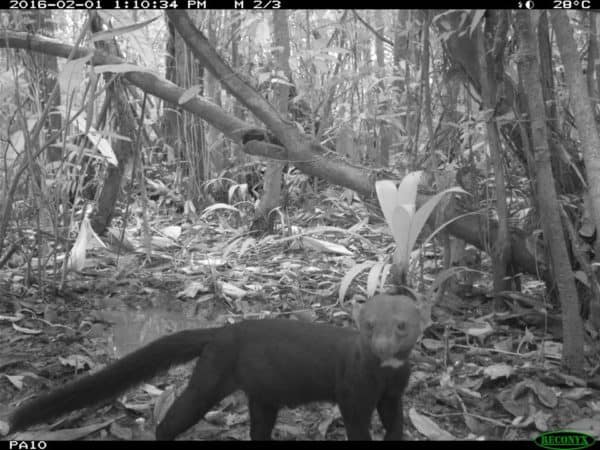

Having reached maximum media exposure about a year ago, the self-photograph or selfie, along with its related apparatus, the selfie stick, may now be considered in poor taste within certain quarters, but who among us can resist the recently posted collection of rare and before-unseen animal selfies from the Peruvian Amazon captured by researchers with the Field Museum of Natural History in Chicago?
The museum’s team of 25 scientists spent 17 days conducting a “rapid biological and social inventory” of the Medio Putumayo-Algodón region in Northern Peru, with the aim of documenting the area’s flora and fauna for conservation purposes.
“No scientists have ever explored this area, let alone document it with cameras and drones,” says Jon Markel, the Field Museum’s Geographic Information Systems (GIS) specialist. “These images are the first time this remote wilderness and the species that call it home are being recorded for science.”
According to the Field Museum’s research team, their inventory was conducted in consultation with nine different indigenous groups living in the area who see their land as threatened by deforestation, mining, logging and a proposed road planned to run through the area.
Using 14 motion-sensitive trap cameras and a drone for aerial footage, the team documented the presence of 1,820 different plant, fish, amphibian, reptile, bird and mammal species, including a remarkable 19 species suspected to be new to non-indigenous observers and scientists. The photos give the viewer remarkable access to these species in their natural habitat, many of whom are already known to be either endangered or threatened, including the South American tapir (the largest land mammal in the Amazon), the giant armadillo and the white-lipped peccary.
“You can’t argue for the protection of an area without knowing what is there,” says Corine Vriesendorp, director of The Field Museum’s rapid inventory program. “We discovered an intact forest inhabited by indigenous people for centuries and teeming with wildlife. We want it to survive and thrive long after our cameras are gone.”
With last week’s signing of the Paris Agreement on climate change in New York City, state leaders from around the world are now tasked with making good on their promises to work towards decreasing carbon emissions and working towards a sustainable future, with the regions of the Amazon Rainforest clearly in mind for their role in lowering global carbon dioxide levels. This past weekend Peruvian community leaders were on hand in New York to protest the lack of inclusion of indigenous groups at the international climate talks.
One of the world’s largest natural history museums the Field Museum was established in 1893 originally as a repository for materials and collections exhibited at the Chicago World’s Fair of the same year. In just its first 50 years in operation the museum sent out over 440 expeditions to gather specimens from all around the world.
Viewers can check out the Field Museum’s images of the Peruvian rainforest expedition on its Facebook page and learn more about their research projects and rapid inventories on the Museum’s website.
Leave a Reply
You must be logged in to post a comment.




 Share
Share Tweet
Tweet Share
Share




Comment